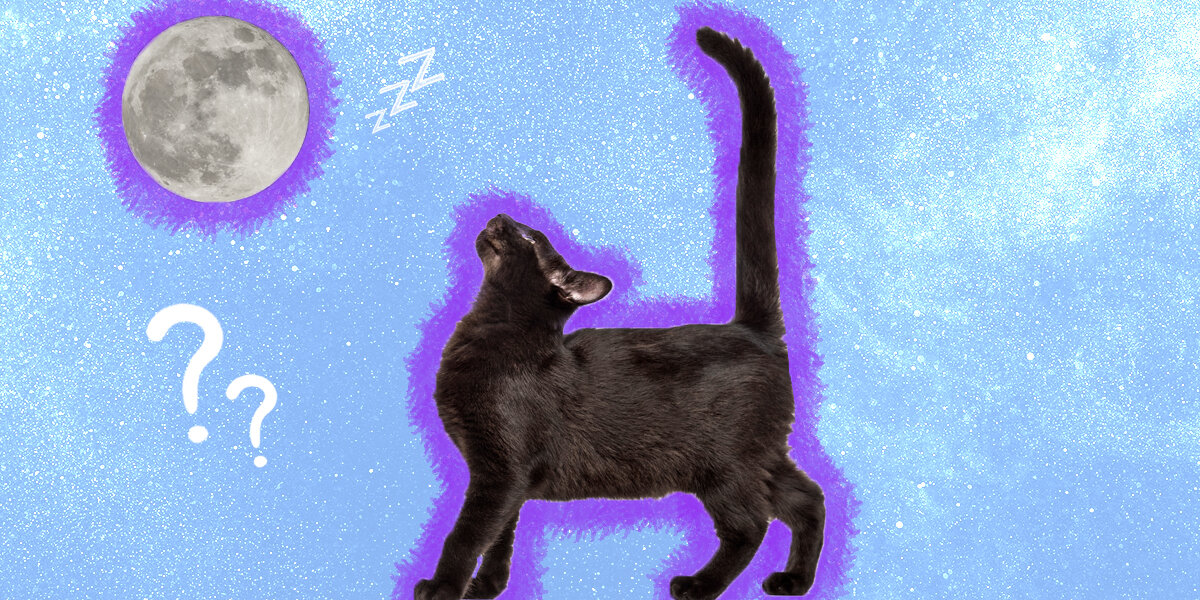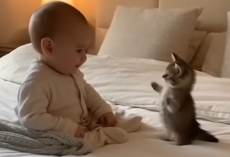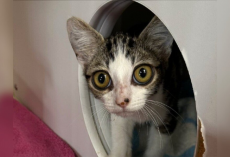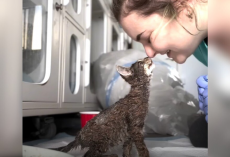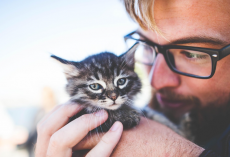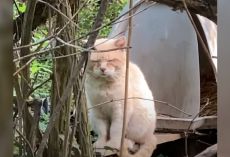If your cat seems to treat midnight like prime party time — sprinting down hallways, knocking things over, and meowing like he’s auditioning for a Broadway show — you might be wondering if he’s nocturnal.
After all, he naps all day and saves his energy for 3 a.m. chaos. But here’s the twist: your cat isn’t actually nocturnal.
To figure out what’s really going on with your cat’s nighttime energy, Dr. Sabrina Kong, veterinarian at Lathrop Veterinary Center, and Dr. Jonathan Roberts, remote vet with Excited Cats have some answers.
So … Are Cats Nocturnal?
Not exactly.
While true nocturnal animals like owls and raccoons sleep all day and stay up all night, cats fall into a different category.
“Believe it or not, cats are not actually nocturnal,” Dr. Roberts explained. “They’re crepuscular — meaning they’re most active at dawn and dusk.”
In other words, your cat’s favorite times to play, pounce, or demand breakfast are those low-light hours when the world is just waking up or winding down.
And while cats do sleep a lot, they’re not built to snooze through the entire day like nocturnal animals are.
“They might be more active during the dark parts of the day, but they’re not wired to sleep all day long,” Dr. Kong said.
Why Are Cats So Active At Night?
It all comes down to evolution.
Your cat’s ancestors were desert hunters who learned to stalk prey during the cooler twilight hours — when it was easier to stay hidden and avoid predators.
“This adaptation allowed them to hunt in the cool of the day with just enough light to visualize, stalk and catch their prey,” Dr. Roberts said.
Those early cats hunted at dusk and dawn, then rested in between hunts. It was the perfect rhythm for survival — and domestic cats still follow that natural pattern today.
“Hunting at dusk and dawn gives cats an advantage because they’re less likely to be seen by predators,” Dr. Kong added.
How Much Do Cats Actually Sleep?
A lot. Like, a lot.
“Cats sleep 15 to 20 hours a day — mostly during daylight,” Dr. Kong said.
But that doesn’t mean they’re in a deep sleep the whole time. Most of those hours are made up of quick naps — the famous “catnaps” that last 15 to 30 minutes.
Even when they’re snoozing, cats are still half-alert, always ready to leap up if they sense danger.
“This isn’t the ‘hard sleep’ we might be thinking of,” Dr. Kong explained. “Most of the time, they’re in a light snoozing state.”
In fact, about 75% of a cat’s sleep is light sleep, while only 25% is true deep rest, according to Dr. Roberts.
Can Cats See in the Dark?
Not in total darkness — but almost.
Cats are built to see in dim light. Their eyes have more rods (the receptors that detect light) than humans do, plus a special reflective layer called the tapetum lucidum, which bounces light back through the retina to amplify what little light is available.
That’s also why your cat’s eyes glow in the dark when a light hits them.
“If there’s even a little bit of light in the room, cats can see much more than we can,” Dr. Kong said.
Their pupils can widen dramatically to let in more light — and their slit-shaped pupils help them perfectly judge distance before pouncing.
How To Stop Your Cat From Waking You Up At Night
Even if your cat’s behavior makes perfect biological sense, it can still wreck your sleep. Thankfully, there are a few tricks that can help:
🕓 Get your cat on your schedule
Play with your cat about an hour before bed, then feed him dinner right after.
“Follow playtime with a meal, and your cat will naturally want to rest,” Dr. Roberts advised.
🎯 Provide daytime stimulation
Keep your cat entertained while you’re away — with puzzle feeders, climbing posts, or interactive toys — so he’s not bursting with energy at midnight.
You can get this interactive butterfly toy from Amazon..
🙈 Ignore the nighttime drama
If your cat wakes you up, resist the urge to react.
“Feeding or petting them reinforces the behavior,” Dr. Roberts said. “Even pushing them off the bed counts as attention.”
🚪 Create a separate sleep zone
If all else fails, set up a cozy nighttime space for your cat in another room with food, water, and a litter box — and close your bedroom door.
The Bottom Line
Your cat isn’t trying to drive you crazy — he’s just following instincts that go back thousands of years.
With a little patience and a good bedtime routine, you can help him adjust to your schedule … or at least make those 3 a.m. zoomies a little less frequent.
We independently pick all the products we recommend because we love them and think you will too. If you buy a product from a link on our site, we may earn a commission.

